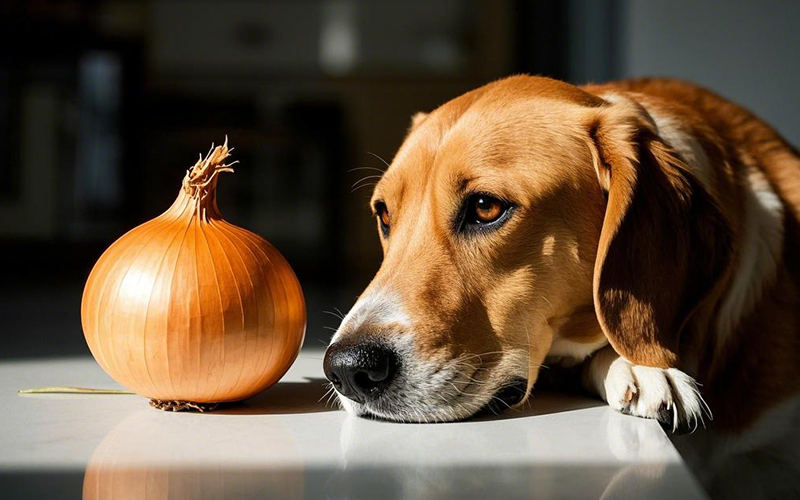Can Dogs Eat Onion? The Risks You Need to Know
- 11 Mar 2025 11:25
Onions are a common ingredient in many kitchens, found in everything from soups and stews to stir-fries and salads. But if you’re a dog owner, you may wonder: can dogs eat onion? The answer is no—onions are toxic to dogs and should never be fed to your furry friend, whether raw, cooked, or in any form.

Why Are Onions Dangerous for Dogs? ⚠️
Onions, along with garlic, belong to the allium family of plants, which also includes leeks, chives, and shallots. These foods contain compounds that can be harmful to dogs, particularly thiosulfates. When consumed, thiosulfates can damage a dog’s red blood cells, leading to a condition called hemolytic anemia, which can be very serious.
How Does Onion Affect Dogs?
When a dog eats onion, the compounds in the vegetable cause the red blood cells to break down prematurely. This leads to anemia, which can cause a range of symptoms and complications. The effects are usually more severe with larger quantities of onion, but even small amounts consumed over time can have harmful effects.
Symptoms of Onion Toxicity in Dogs 😟
If your dog has eaten onion, it’s important to watch for signs of onion toxicity. Symptoms of anemia or poisoning may include:
Weakness or lethargy 💤
Pale gums 🦷
Vomiting or diarrhea 🤢
Loss of appetite 🍽️
Tiredness or excessive panting 🐾
Dark-colored urine (indicating red blood cells breaking down) 💧
Stomach pain or discomfort 🐕
These symptoms may not appear immediately after consumption but can develop several hours to days after eating onion. If you suspect your dog has eaten onion, contact your veterinarian immediately for advice and potential treatment.
How Much Onion Is Toxic to Dogs? ⚖️
The toxicity of onions to dogs depends on several factors, including the size of the dog, how much onion was consumed, and the form of onion (raw, cooked, powdered, etc.).
Raw onion tends to be the most potent, as it contains the highest levels of thiosulfates.
Cooked onion still retains some toxic properties, although cooking reduces the levels of thiosulfates.
Onion powder, which is often used in seasoning blends, is also highly concentrated and can be even more dangerous than fresh onion.
Generally, a small amount of onion may not immediately harm a large dog, but even small amounts over time can lead to significant health issues, especially for smaller dogs.
What to Do if Your Dog Eats Onion 🍽️
If your dog has consumed any amount of onion, it’s crucial to act quickly:
Call your vet immediately: Even if you’re unsure how much onion your dog ate, it’s better to be safe and get professional advice. Your vet can determine the severity of the situation and suggest appropriate treatment.
Inducing Vomiting: If the ingestion was recent (within a few hours), your vet might recommend inducing vomiting to prevent the onion from entering the bloodstream and causing further harm.
Treatment: In some cases, your vet may recommend treatment with activated charcoal to absorb the toxins, or they may administer intravenous fluids and other medications to support your dog’s recovery.
Long-Term Effects of Onion Toxicity in Dogs 🕰️
If onion toxicity goes untreated, it can lead to severe health problems. The damage to red blood cells can cause ongoing anemia, which can be life-threatening. Without intervention, the condition may worsen, leading to organ failure, especially in cases where a large amount of onion has been ingested.
Safe Alternatives to Onion for Dogs 🥦
Since onions should never be fed to dogs, it’s essential to know which safe vegetables and fruits you can offer as healthy alternatives. Here are some dog-friendly options:
Carrots 🥕: A great source of vitamins and fiber, and safe for dogs to eat.
Sweet Potatoes 🍠: High in fiber and antioxidants, and an excellent alternative to starchy vegetables.
Green Beans 🌱: Low in calories and easy on your dog’s digestive system.
Cucumber 🥒: Hydrating and refreshing, perfect for summer.
Pumpkin 🎃: Helps with digestion and is a nutritious treat for your dog.
If you want to add extra flavor to your dog’s meals, consider using herbs that are safe for dogs, such as parsley, basil, or rosemary. Just be sure to avoid herbs from the allium family, including onions and garlic.
Conclusion 🎉
In conclusion, onions are dangerous for dogs and should never be included in their diet. Whether raw, cooked, or in powdered form, onions contain compounds that can lead to hemolytic anemia and other serious health problems. If your dog consumes onion, contact your vet immediately for proper treatment. The earlier you seek help, the better the chances for a full recovery.
If you're ever in doubt about what food is safe for your dog, consult with your veterinarian or consider using PettureX, an AI-powered pet health assistant that offers 24/7 online consultations to help you make the best decisions for your furry friend's well-being. Stay safe and keep your pup onion-free! 🐾
Related

Crunchy Curiosity: Can Dogs Safely Snack on Pork Rinds? A Deep Dive
- 21 Apr 2025
Pomegranate Seeds and Pooches: A Deep Dive into Whether Dogs Can Safely Indulge
- 21 Apr 2025
Can Dogs Eat Peaches? Vet Explains Benefits, Cyanide Risks & Safe Serving
- 16 Apr 2025
Can Dogs Eat Mulberries? Vet Explains Safety, Benefits & Potential Risks
- 16 Apr 2025
Can Dogs Eat Mozzarella? Vet Explains the Cheesy Truth (Risks & Benefits)
- 16 Apr 2025
Can Dogs Eat Maple Syrup? The Sugary Truth & Why Vets Advise Against It
- 16 Apr 2025
Can Dogs Eat Mango Skin? Vet Explains Why It's a Risky Chew!
- 16 Apr 2025
Can Dogs Eat Mac n Cheese? Vet Explains Why This Comfort Food Is Unsafe!
- 16 Apr 2025
Can Dogs Eat Liver? Vet Guide to This Nutrient-Dense Organ Meat (Benefits & Risks!)
- 16 Apr 2025
Can Dogs Eat Lamb? Vet Insights on This Nutritious Meat Option
- 16 Apr 2025
